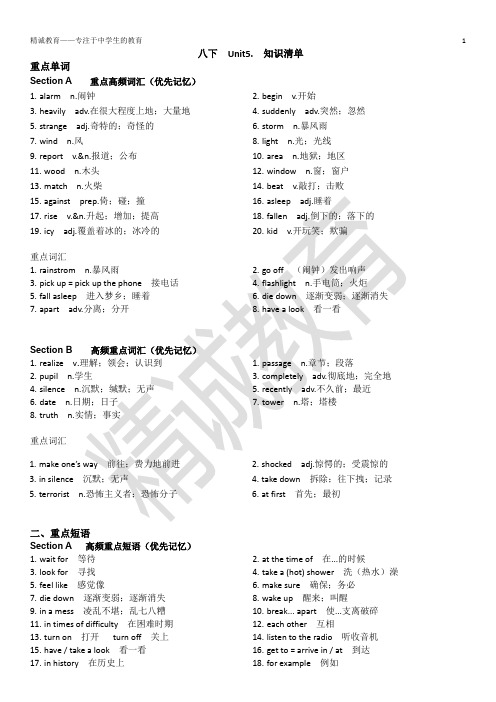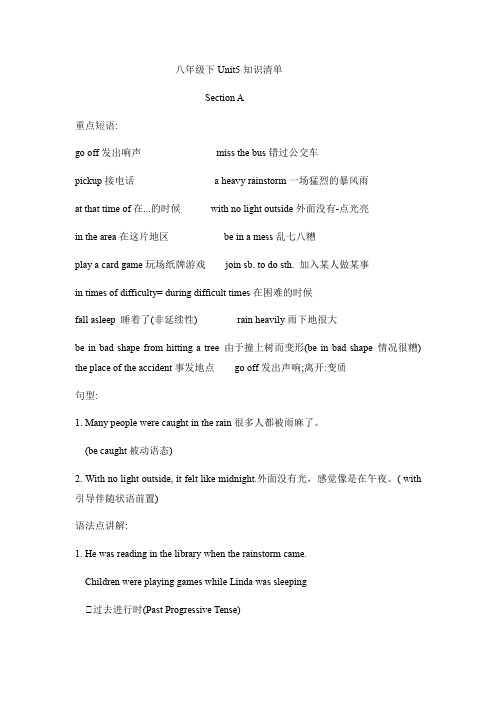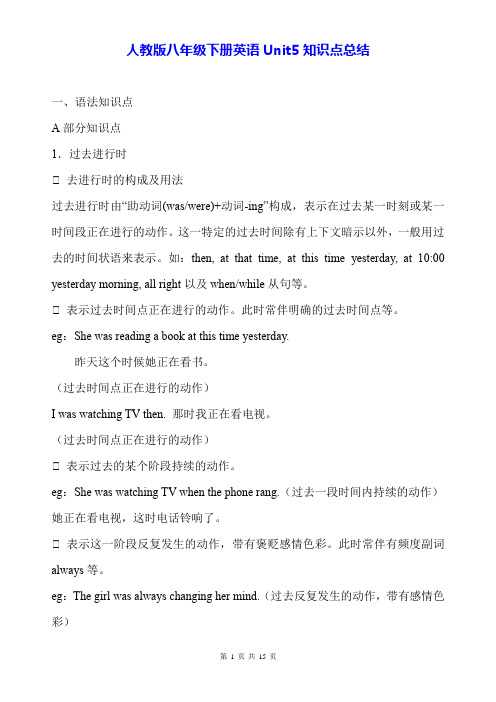人教版英语八年级下册U5单词及重点归纳
- 格式:pdf
- 大小:98.04 KB
- 文档页数:12

八下Unit5. 知识清单重点单词Section A 重点高频词汇(优先记忆)1.alarm n.闹钟2.begin v.开始3.heavily adv.在很大程度上地;大量地4.suddenly adv.突然;忽然5.strange adj.奇特的;奇怪的6.storm n.暴风雨7.wind n.风8.light n.光;光线9.report v.&n.报道;公布10.area n.地狱;地区11.wood n.木头12.window n.窗;窗户13.match n.火柴14.beat v.敲打;击败15.against prep.倚;碰;撞16.asleep adj.睡着17.rise v.&n.升起;增加;提高18.fallen adj.倒下的;落下的19.icy adj.覆盖着冰的;冰冷的20.kid v.开玩笑;欺骗重点词汇1.rainstrom n.暴风雨2.go off (闹钟)发出响声3.pick up = pick up the phone 接电话4.flashlight n.手电筒;火炬5.fall asleep 进入梦乡;睡着6.die down 逐渐变弱;逐渐消失7.apart adv.分离;分开8.have a look 看一看Section B 高频重点词汇(优先记忆)1.realize v.理解;领会;认识到 1.passage n.章节;段落2.pupil n.学生pletely adv.彻底地;完全地4.silence n.沉默;缄默;无声5.recently adv.不久前;最近6.date n.日期;日子7.tower n.塔;塔楼8.truth n.实情;事实重点词汇1.make one’s way 前往;费力地前进2.shocked adj.惊愕的;受震惊的3.in silence 沉默;无声4.take down 拆除;往下拽;记录5.terrorist n.恐怖主义者;恐怖分子6.at first 首先;最初二、重点短语Section A 高频重点短语(优先记忆)1.wait for 等待2.at the time of 在...的时候3.look for 寻找4.take a (hot) shower 洗(热水)澡5.feel like 感觉像6.make sure 确保;务必7.die down逐渐变弱;逐渐消失8.wake up 醒来;叫醒9.in a mess 凌乱不堪;乱七八糟10.break... apart 使...支离破碎11.in times of difficulty 在困难时期12.each other 互相13.turn on 打开turn off 关上14.listen to the radio 听收音机15.have / take a look 看一看16.get to = arrive in / at 到达17.in history 在历史上18.for example 例如Section B 高频重点短语(优先记忆)1.the rest of 剩余的...2.have meaning to sb 对某人有(特殊的)意义3.tell the truth 说实话4.point out 指出5.go away 离去6.three times a week 每周三次7.call out 大声呼叫8.by the side of the road 在路边9.walk by 路过10.as well 也三、语法总结一、过去进行时1. 定义表示在过去某一时刻或某一时间段内正在进行或发生的动作。

八年级下Unit5知识清单Section A重点短语:go off发出响声miss the bus错过公交车pickup接电话 a heavy rainstorm一场猛烈的暴风雨at that time of在...的时候with no light outside外面没有-点光亮in the area在这片地区be in a mess乱七八糟play a card game玩场纸牌游戏join sb. to do sth. 加入某人做某事in times of difficulty= during difficult times在困难的时候fall asleep 睡着了(非延续性) rain heavily雨下地很大be in bad shape from hitting a tree 由于撞上树而变形(be in bad shape 情况很糟) the place of the accident事发地点go off发出声响;离开:变质句型:1. Many people were caught in the rain很多人都被雨麻了。
(be caught被动语态)2. With no light outside, it felt like midnight.外面没有光,感觉像是在午夜。
( with 引导伴随状语前置)语法点讲解:1. He was reading in the library when the rainstorm came.Children were playing games while Linda was sleeping①过去进行时(Past Progressive Tense)定义:表示在过去某一时刻或某一段时间正在进行的动作。
这一特定的过去时间除有上下文暗示以外,一般用时间状语来表示。
构成: was\were+ v-ingI was taking a shower at 8 last night.He was reading in the library when the rainstorm came.Jenny was helping Mary with her homework while Linda was sleeping.①when和while在过去进行时态当中的区别while引导的时间状语从句,其谓语动词只能是延续的如work, watch,study... 而When其后既可跟延续性动词,也可跟非延续性动词,如come,go.while后常引导过去进行时态,when 后面常引导一般过去时。

八年级英语下册Unit5知识点【Section A】【重点单词】1.alarm n.闹钟2.wind n.风3.storm n.暴风雨4.area n.地域;地区5.suddenly adv.突然6.window n.窗户7.realize v.领会;认识到8.strange adj.奇特的;奇怪的9.heavily adv.在很大程度上;大量地【词形变换】1.begin v.开始→beginning(现在分词)began(过去式)2.heavily adv.在很大程度上;大量地→ heavy(adj.)3.report v.&n.报道;公布→ reporter(n.记者)4.match n.火柴→matches(复数)5.beat v.敲打;打败→beat(过去式)6.asleep adj.睡着的→sleepy(adj.困乏的;欲睡的)sleep(v.睡;睡觉)7.rise v.&n.升起;增加;提高→rose(过去式)8.fall v.倒塌;跌倒;掉落→fell(过去式)fallen(adj.倒下的;落下的)9.icy adj.覆盖着冰的;冰冷的→ice(n.冰)10.kid v.开玩笑;欺骗→kidding(现在分词)【重点短语】1.在暴风雨来的时候at the time of the rainstorm2.在公交站点at the bus stop3.等公交车wait for the bus4.(闹钟)发出响声go off5.洗热水澡take a hot shower6.接电话pick up (=pick up the phone)7.使……靠拢bring ...close together8.室外没有光with no light outside9.在附近街区in the neighborhood10.确保;查明make sure11.逐渐变弱;逐渐消失die down12.醒来;唤醒;叫醒wake up13.一团糟in a mess14.使……分离break...apart15.在困难的时候in times of difficulty【重点句型】1.当暴风雨来临时他正在图书馆里看书。

Unit 5 What were you doing when the rainstorm came?一、词汇与短语◆重点单词A部分1.rainstorm 暴风雨n.2.window 窗;窗户n.3.alarm 闹钟n.4.flashlight 手电筒;火炬n. 5.suddenly 突然;忽然adv.6.match 火柴n.7.strange 奇特的;奇怪的adj.8.against 倚;碰;撞prep. 9.storm 暴风雨n.10.asleep 睡着adj.11.begin 开始v.12.rise 升起;增加;提高v.&n. 13.heavily 在很大程度上;大量地adv.14.fallen 倒下的;落下的adj. 15.wind 风n.16.apart 分离;分开adv. 17.light 光;光线;光亮n.18.icy 覆盖着冰的;冰冷的adj. 19.report 报道;公布v.&n.20.kid 开玩笑;欺骗v.21.area 地域;地区n.22.beat 敲打;打败v.23.wood 木;木头n.B部分1.realize 理解;领会;认识到v.2.recently 不久前;最近adv. 3.passage 章节;段落n.4.terrorist 恐怖主义者;恐怖分子n. 5.pupil 小学生n.6.date 日期;日子n. 7.completely 彻底地;完全地adv.8.tower 塔;塔楼n.9.shocked 惊愕的;受震惊的adj.10.truth 实情;事实n. 11.silence 沉默;缄默;无声n.◆重点短语A部分1.pick up ( = pick up the phone) 接电话2.have a look 看一看3.die down逐渐变弱;逐渐消失4.at the bus stop 在公交车站5.go off (闹钟)发出响声6.wait for 等待7.go to work 去上班8.rain heavily 下大雨9.see sb. doing sth. 看见某人正在做某事10.begin to do sth. 开始做某事11.take a shower 洗淋浴12.at that time 在那时13.so many times 这么多次14.feel like 感觉像15.need help with sth. 需要……(方面)帮助16.make sure 确保17.with no light outside 外面没有灯光18.help sb. (to) do sth. 帮助某人做某事19.put……over……把……覆盖在……上20.make dinner 做晚饭21.put sth. on the table 把某物放在桌子上22.play a card game 玩纸牌游戏23.beat heavily against the windows 猛烈地敲打着窗户24.get to the place of the accident 到达事故发生地25.have fun 玩得愉快26.wake up 醒来;叫醒27.at first 起初;起先28.in times of difficulty 在困难时29.fall asleep 进入梦乡;睡着30.right away 立刻;马上31.go outside with sb. 和某人一起出去32.in the library 在图书馆33.find sth. in a mess 发现……一片狼藉34.on the street 在大街上35.break sth. apart 把某物折断(或分开)B部分1.in silence 沉默;无声2.in history 在历史上3.take down 拆除;往下拽;记录4.remember doing sth. 记得做过某事5.make one's way 前往;费力地前进6.look out of the window 向窗外看7.the school basketball competition 学校篮球比赛8.have meaning to sb.对某人来说有意义9.walk by 从旁边经过10.point sth. out to sb. 向某人指岀某物11.by the side of the road 在路边12.go away 离开13.at the event 在这次活动中14.as well 也15.be late for 迟到16.call out the winner 宣布获胜者17.on this day 在这一天18.10 minutes ago 十分钟前19.on April 4 在四月四日20.be completely shocked 完全震惊了21.an important event 一次重要的事件22.the rest of 其余的23.on the radio 在收音机上◆重点句子A部分1.What were people doing yesterday at the time of the rainstorm?昨天暴风雨来临时人们正在干什么?2.when the rain storm suddenly came, what were you doing?当暴风雨突然来临时,你正在做什么?3.So while you were sleeping, I called Jenny and she helped me.因此在你睡觉的时候,我打电话给珍妮,她帮了我。

八下Unit 5一、单词扩展1.realize—realized (过去式) 2.make—made (过去式) 3.complete (形容词)—completely (副词)4.shock (动词)—shocked (形容词)5.silent (形容词)—silence (名词) 6.recent (形容词)—recently (副词) 7.take—took (过去式)8.true (形容词)—truly (副词)—truth (名词)二、短语1.in silence2.make one’s way to …3. die down4. at first5.go off6.pick up7. at the time of8. be strange to9. fall asleep10.turn on 打11.It is said that..三、知识点汇总解析1. My alarm didn’t go off so I got up late.2. I called at seven and you didn’t pick up.3.I called again at eight and you didn’t answer then either.4. That’s strange.5. With no ligh t outside, it felt like midnight.6. Ben was helping his mom make dinner when the rain began to beat heavily against the windows.7.He finally fell asleep when the wind was dying down at around 3:00 a.m.8.When he woke up, the sun was rising.9. My parents were completely shocked.10. My parents did not talk after that and we finished the rest of our dinner in silence.11. More recently, most Americans remember what they were doing when the world Trade Center in New York was taken down by terrorists.12. I didn’t believe him at first, b ut then I looked out of the window and realized that it was true.解析版1. My alarm didn’t go off so I got up late.go off ①(闹钟)发出响声①离开,走开①(食物)变质变坏①(水电等中断)2. I called at seven and you didn’t pick up.pick up ①捡起;拾起①搭载,(开车)接某人①学会,得到3.I called again at eight and you didn’t answer then either.either adv.也在本句中作副词,用于否定句中。

人教版八年级下册英语Unit5知识点总结一、语法知识点A部分知识点1.过去进行时❶ 去进行时的构成及用法过去进行时由“助动词(was/were)+动词-ing”构成,表示在过去某一时刻或某一时间段正在进行的动作。
这一特定的过去时间除有上下文暗示以外,一般用过去的时间状语来表示。
如:then, at that time, at this time yesterday, at 10:00 yesterday morning, all right以及when/while从句等。
❶ 表示过去时间点正在进行的动作。
此时常伴明确的过去时间点等。
eg:She was reading a book at this time yesterday.昨天这个时候她正在看书。
(过去时间点正在进行的动作)I was watching TV then. 那时我正在看电视。
(过去时间点正在进行的动作)❶ 表示过去的某个阶段持续的动作。
eg:She was watching TV when the phone rang.(过去一段时间内持续的动作)她正在看电视,这时电话铃响了。
❶ 表示这一阶段反复发生的动作,带有褒贬感情色彩。
此时常伴有频度副词always等。
eg:The girl was always changing her mind.(过去反复发生的动作,带有感情色彩)这个女孩老是改变主意。
❶ 表示过去动作延迟到以后发生,即用过去进行表过去将来,此类动词是一些位置的变化的词。
eg:He told me that he was going soon.(过去进行表将来)他告诉我他很快就要走了。
❶ 过去进行时的一般疑问句句型:Be(Was/Were)+主语+现在分词+其他?肯定回答:Yes,主语+be(was/were).否定回答:No,主语+be(was/were) not.eg:--Were you cooking at that time? 那时,你在做饭吗?--Yes, I were.是的。
(完整版)人教版新目标八年级下册英语Unit5知识点人教版新目标八年级下册英语Unit5知识点Unit 5内容简介本单元主要介绍了关于过去事件的讨论和描述。
学生研究了过去完成时的用法,掌握了过去完成时态的构成、肯定句、否定句和疑问句的用法,并通过例句和练加深了对过去完成时的理解。
同时,学生还研究了如何根据图片提示以及其他相关信息准备口头报告。
Unit 5知识点总结1. 过去完成时态(Past Perfect Tense)- 过去完成时态表示在过去某一时间或动作之前已经发生或完成的动作或状态。
- 构成:had + 过去分词(had是过去完成时的助动词,根据主语变化,后接过去分词构成谓语)- 肯定句结构:主语 + had + 过去分词 + 其他- 否定句结构:主语 + hadn't + 过去分词 + 其他- 疑问句结构:Had + 主语 + 过去分词 + 其他?2. 过去完成时态的用法- 用于表示已经发生或完成的动作或状态,强调动作发生在过去某个时间之前。
- 指示两个过去发生的动作中,先发生的动作使用过去完成时,后发生的动作使用一般过去时。
Unit 5附加题目请回答以下问题:1. 过去完成时态的构成是什么?2. 过去完成时态的肯定句结构是什么?3. 过去完成时态可以用来表示什么?问题回答1. 过去完成时态的构成是had + 过去分词。
2. 过去完成时态的肯定句结构是主语 + had + 过去分词 + 其他。
3. 过去完成时态可以用来表示在过去某一时间或动作之前已经发生或完成的动作或状态。
英语人教版八年级下册Unit5单词讲解...单词详解!详解!Unit 5 What were you doing when the rainstorm came?Section A1. rainstorm [ˈreɪnstɔ:m] n. 暴风雨a heavy rainstorm 一场大暴风雨at the time of the rainstorm在暴风雨来临时What were you doing at the time of therainstorm?= What were you doing when therainstorm came?暴风雨来临时你在做什么?2. alarm [əˈlɑ:m] n. 闹钟an alarm(clock) 一个闹钟3. go off (闹钟)发出响声没有被动语态。
My alarm clock goes off at six in themorning.我的闹钟早上六点钟响铃。
4. begin [bɪˈgɪn] v.(began/bɪˈɡæn/)开始◆ begin begins beginning beganbegun◆同义词:start◆ begin+n./to do/doing=start+n./to do/doingHe began/started his work after awhile.过了一会儿他开始工作。
What were you doing when Ibegan/started to read?= What were you doing when Ibegan/started reading?当我开始读书时,你在做什么?◆一般情况下,begin/start to do=begin/start doing下列3种情况下后接to do较好:①主语是sth.不是sb.时:What were you doing when itbegan to rain hard?刚开始下打雨时,你在做什么?②本身是-ing形式时:He is beginning to talk to hismother.他将要开始和母亲谈话了。
八年级人教版英语u5知识点Unit 5词汇:1. edition n.版本;版次2. achieve v.达到,实现3. concentrate v.集中,全神贯注4. purpose n.目的,意图5. measure v.测量6. furniture n.家具7. block n.街区8. rent n.租金9. slightly adv.轻微地,稍微10. expect v.期望,预期11. culture n.文化12. entire adj.全部的,整个的13. invest v.投资14. feature n.特征,特色15. equal adj.相等的,平等的Unit 5语法:1. 一般过去时态一般过去时态是描述过去发生的事情,叙述的是“过去的事情”。
“一般过去时”无需判断所述事件是完成了还是正在进行(一般将其和过去延续性动作区分),仅仅是强调事情是发生在过去的。
如:I studied Chinese two years ago. (我两年前学过中文。
)He was at home yesterday afternoon. (昨天下午他在家里。
)2. 特殊疑问句特殊疑问句是指以特殊疑问词开头,句子以问号结尾的句子。
其特点是:疑问词起到具体化和限制的作用,一般具有7个基本疑问词:who (谁), what (什么), when (什么时候), where (哪里), why (为什么), how (怎么), how many (多少) 。
如:What book did you buy? (你买了什么书?)Where did you go last weekend? (上个周末你去哪里了?)Who is your best friend? (你最好的朋友是谁?)3. 现在完成时态现在完成时态采用“have / has + 过去分词”的结构。
现在完成时反映目前的状态的来源是过去发生的事情。
人教版八下Unit 5 重点知识点清单一、重点词汇1.alarm:闹钟2.begin:开始3.heavily:在很大程度上;大量地4.suddenly:突然;忽然5.strange:奇特的;奇怪的6.storm:暴风雨7.wind:风8.light:光,光线,光亮9.report:报道;公布10.area:地域;地区11.wood:木头12.window:窗户13.match:火柴14.beat:打败;敲打15.against:倚;碰;撞16.asleep:睡着的17.rise:升起;增加;提高18.fallen:倒下的;落下的19.icy:覆盖着冰的;冰冷的20.kid:开玩笑;欺骗21.realize:理解;领会;认识到22.passage:章节;段落23.pupil:学生pletely:彻底底;完全地25.silence:沉默;无声26.recently:不久前;最近27.date:日期;日子28.tower:塔29.truth:事实二、重点短语1.go off:(闹钟)发出响声2.pick up:接电话3.fall asleep:入睡4.die down:逐渐消失5.make one’s way:前进,前往6.in silence:沉默;无声7.take down:写下;记下8.at first:期初;首先9.wake up:醒来;叫醒10.wait for:等待…11.at the time of:在…的时候三、重点语法1.pick up:①“接电话” eg:I called you last night but you didn’t pick up.①“捡起,拾起” eg:Please pick the ruler on the ground.①“搭载某人” eg:Mike will drive his car to pick me up.2.die down:指声音逐渐减弱,逐渐消失,逐渐平息。